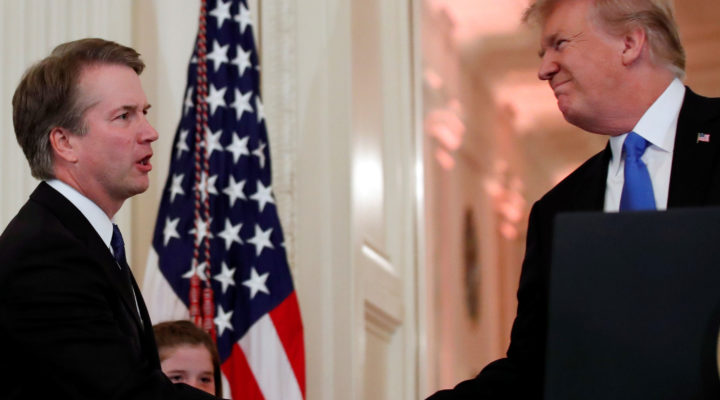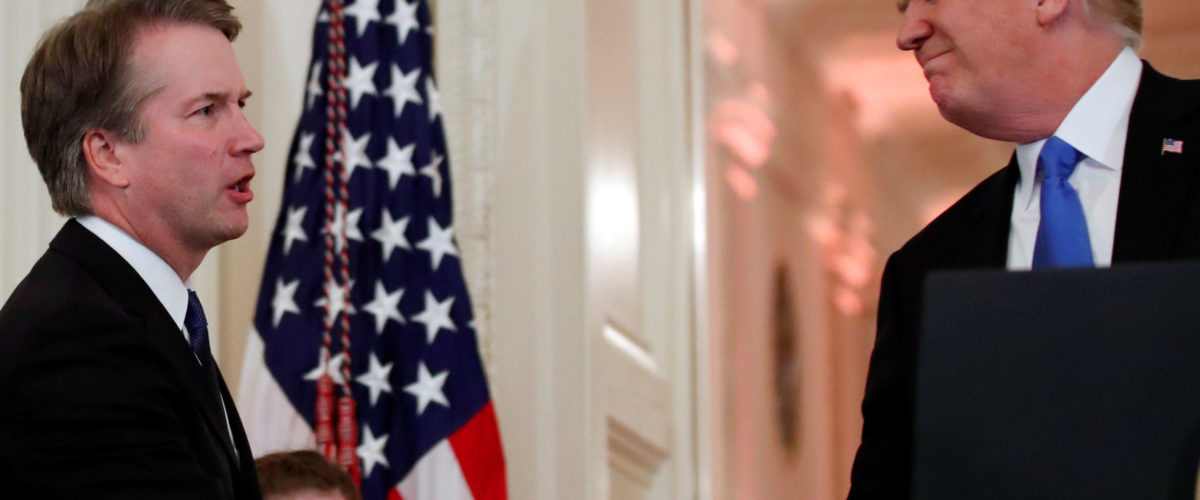It’s not every day that the progressive Americans United for the Separation of Church and State and the conservative American Family Association agree on something.
But it’s happened thanks to President Trump, whose nomination of Brett Kavanaugh, 53, to the U.S. Supreme Court has created some strange bedfellows.
It’s also generated a lot of uncertainty across the political spectrum as organizations on the right and left struggle to interpret Kavanaugh’s 12-year tenure as a federal circuit judge.
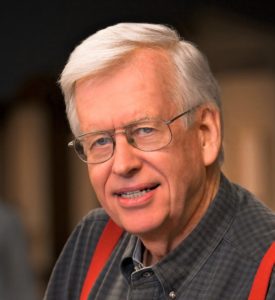
Ellis West
If history is any indication, placing hope in the confirmation process may be fruitless as Kavanaugh is unlikely to give answers completely satisfying to anyone, said Ellis West, emeritus professor of political science at the University of Richmond and author of The Religion Clauses of the First Amendment.
What hearings may reveal, and what can be gleaned from past opinions and rulings, is no guarantee how they will rule once on the high court, he said.
“It’s impossible to get certainty in these picks,” said West, a member of Richmond’s River Road Church, Baptist.
Wide-ranging opinions
But that hasn’t kept some on the right from concluding, with much certainty, how a confirmed Kavanaugh would serve on the court.
“Judge Kavanaugh is an outstanding choice for a Supreme Court justice,” Russell Moore, president of the Southern Baptist Convention’s Ethics and Religious Liberty Commission, said in an online statement. “He will interpret the Constitution, not attempt to create laws from the bench.”
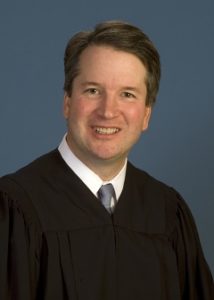
Brett Kavanaugh
The ERLC issued a similarly certain and glowing statement July 9, this one signed by nearly 40 conservative evangelical leaders such as Al Mohler, James Merritt, Richard Land, Johnny Hunt, Steve Gaines, Ronnie Floyd and Samuel Rodriguez.
Americans United for Life in a press release predicted Kavanaugh, a Catholic, will be “an originalist” who will stick to the Constitution and, by extension, will support “protections for human life.”
Other social conservatives are convinced Kavanaugh is a terrible pick.
One of them is former U.S. Sen. Rick Santorum, who blasted Trump for giving in to the Washington elite in his pick of Kavanaugh.
“He is from Washington,” Santorum said in a story published online by CNN. “He is the establishment pick. He is the Bush pick.”
Kavanaugh’s record was a major concern for American Family Association President Tim Wildmon, who issued a statement describing Kavanaugh as weak on religious liberty, life and Obamacare.
“For these and other reasons, we are calling on citizens to urge their senators to firmly oppose the nomination of Brett Kavanaugh as a justice on the United States Supreme Court,” Wildmon said.
Some liberals don’t like him, either.
Americans United President and CEO Rachel Laser said Trump’s nominee has a “demonstrated track record of hostility toward church-state separation” and is therefore “intent on eviscerating this fundamental American value” as a potential Supreme Court justice.
Concerns about church-state separation
Others are still doing their homework on Kavanaugh.
“We are carefully looking at his record,” said Holly Hollman, general counsel for the Baptist Joint Committee for Religious Liberty, based in Washington, D.C.
BJC, she added, does not endorse or oppose Supreme Court nominees.
Kavanaugh doesn’t have extensive record on church-state cases during his service on the federal bench, Hollman said.
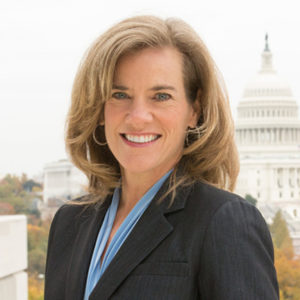
Holly Hollman
However, some clues have emerged, Hollman said. One is that he is known to admire Justice Anthony Kennedy, whom Kavanaugh has been nominated to replace.
Kavanaugh “often writes in a way that reflects Kennedy’s” reasoning, she said.
While Kennedy’s religious liberty opinions have often been disappointing from the BJC’s perspective, the justice has shown an appreciation for placing the individual and religion ahead of government, she said.
Admiration for Kennedy far from guarantees Kavanaugh will take after him if and when confirmed, Hollman said. In fact, he could just as well move the court in a direction “that is more solidly conservative.”
Even Kavanaugh’s active participation in church may not be a predictor of how he’ll lean in religious liberty and church-state separation cases, she said.
“That might mean he is sympathetic to religious claims,” Hollman said. “But that is not the same as upholding a vision of religious liberty for all.”
‘Not a culture warrior’
There actually is a positive in not being able to pin down the thinking and attitudes of Supreme Court nominees, said Mark Valeri, professor of religion and politics at the John C. Danforth Center on Religion and Politics at Washington University in St. Louis.
A judge who is completely predictable on all issues is likely driven by ideology, Valeri said. Those whose stance on issues is uncertain tend to be more open-minded when considering the facts of individual cases.
Legal scholars and others who study the judiciary, he said, say predictability “means they are not really being judges, they are being advocates.”
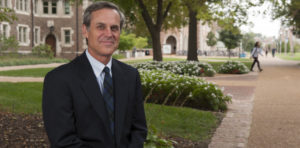
Mark Valeri (Photo/Sid Hastings/WUSTL)
Some conservatives perceive Kavanaugh to be strong on precedent, meaning he may view Roe v. Wade as established law and be unwilling to rule against it in future cases, Valeri said. But it may also hint that he’s willing to grant local and state governments more controls over the practice.
He’s also viewed as generous on Second Amendment issues, and favorable to government and business, Valeri said.
Some liberals, meanwhile, seem to be pleased that Kavanaugh is not a culture warrior bent on reforming society, he said.
Unrealistic expectations
At some point, West said, it boils down to letting the process unfold.
“The problem with any nomination is there are so many different criteria for judging the man or woman, and moreover it’s difficult to determine whether that person meets those criteria,” he said.
Some focus on education and judicial experience and whether a candidate is an originalist who claims to interpret the Constitution by its original meaning.
Others are focused on specific issues, such as abortion, gun rights and religious liberty.
No wonder Supreme Court candidates tend to speak in platitudes during their confirmation hearings.
“You’re dealing with areas of law so complicated that it’s really impossible for a judge to know in advance how he or she would rule,” West said.
Even if he were to be specific or make promises, West added, Kavanaugh “can turn out to be quite different” once he joins the other justices – especially over time.
The challenge isn’t what people don’t know about judges, but what they want from them, he said.
“People have unrealistic expectations as far as what they would like to know about a judicial nominee,” he said.
Related opinion:

